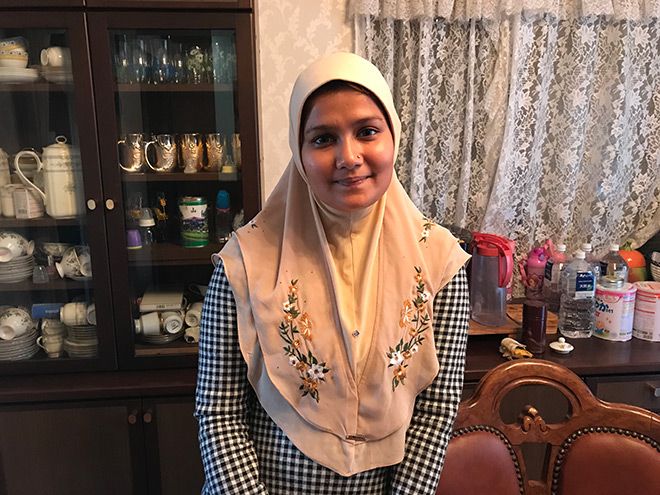When she was in junior high school in Gunma Prefecture, a single remark from the back of the classroom cut Rurika Hasegawa like a blade.
A classmate’s voice—offhand yet cruel—carried across the room: “Her skin is dark because she eats nothing but curry.”
She couldn’t understand why anyone would say such a thing about her, or what it was meant to prove.
“In that moment, I was truly, deeply hurt,” she recalled.
Hasegawa was born in Myanmar to Rohingya parents, members of a persecuted Muslim minority. Her family fled and came to Japan in 2001 when she was in the sixth grade.
Each day she brought to school a lunch her mother had carefully packed. She was the only student there who wore a hijab.
With her family’s steady support, high school marked a turning point. She made more friends and found places where trust could grow. She went on to a vocational college, married, found work and eventually became a Japanese citizen.
Now in her mid-30s, she is raising five children, ages 5 to 14.
“Before I know it, the day is over in a flash,” she cheerfully said of her crowded, happy routine.
What, after all, is a nationality? The question has stayed with her. Guided by it, she now co-leads the nonprofit Stateless Network, which supports people facing problems of nationality and legal identity.
Japan’s recent drift toward exclusion and xenophobia alarms her.
“I’m very worried,” she said.
Part of her would even like to meet that former classmate again. Did he ever realize how those words he tossed off that day hurt her? He probably didn’t; no one around him had likely taught him how a throwaway line about racial differences could harm someone.
If they met now, she’d want him to see how she has grown—the life she has built and the person she has become. She’d want him to know that we are the same human beings, sharing the same earth, learning—however imperfectly—to live alongside one another.
There is a Japanese expression she especially loves: “junin toiro” (10 people, 10 colors). If there are 10 people, there are 10 distinct hues, 10 ways of being, each worthy of its shade.
“What a beautiful phrase,” Hasegawa said, her voice calm and her smile gentle.
—The Asahi Shimbun, Aug. 18
* * *
Vox Populi, Vox Dei is a popular daily column that takes up a wide range of topics, including culture, arts and social trends and developments. Written by veteran Asahi Shimbun writers, the column provides useful perspectives on and insights into contemporary Japan and its culture.


AloJapan.com